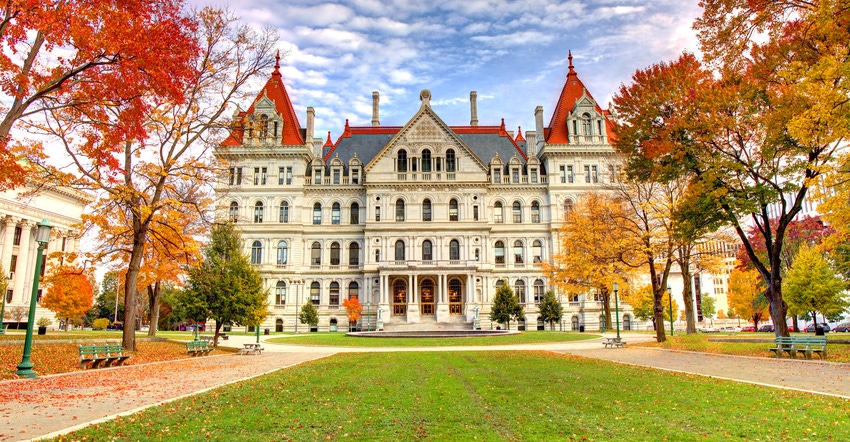February 3, 2020

Mitigating the effects of the state’s farm labor law and providing more money for ag programs are among the 2020 legislative priorities for New York Farm Bureau.
During a recent call with reporters, David Fisher, president of Farm Bureau, and Jeff Williams, public policy director, said that 2019 was a tough year for farmers and their employees, especially given the passage of the Farm Laborer Fair Labor Practices Law.
Fisher and Williams said they were pleased with Gov. Andrew Cuomo’s recent announcement of a refundable investment tax credit for farms. Cuomo is also seeking to expand the definition of “family” in the farm labor law. The current law only excludes immediate family members from provisions like overtime and collective bargaining. According to Farm Bureau, this fails to recognize that farms today often employ extended family members such as in-laws, nieces and nephews.
In addition, Farm Bureau is seeking to alter language in the law to properly recognize that farms have professional-level employees — including farm managers — who should continue to receive salaried wages.
Fisher and Williams said they supported Cuomo’s proposal to increase the farmworker housing loan fund to $15 million to assist farms in building new housing on farms.
There is also a proposal in the New York State Legislature to double the agricultural employee workforce tax credit from $600 to $1,200 per employee.
“These are all important proposals to our farmers and will help offset the tens of millions of dollars in regulatory and overtime costs that our farms will have to pay in this tight farm economy,” Fisher said.
Wage board hearings
Fisher will serve as the New York Farm Bureau representative on the newly created wage board as mandated in the farm labor law. The three-person board, which also includes representatives from the AFL-CIO and the Department of Labor, will look at the 60-hour overtime threshold and whether agriculture can withstand it being lowered. The first hearing must happen by March 1.
Farm Bureau is asking that the three proposed hearings be held in farming regions of New York, ideally in the western, central and Capital Region.
“Keep in mind, the first hearing will happen before the first crops are even in the ground. It will be incredibly difficult to judge, in a significant way, how farms and their employees are managing schedules and dealing with the financial burdens just two months into the year,” Fisher said.
More funding for ag programs
Fisher and Williams said they are pleased with the overall spending amount for agriculture in Cuomo’s budget, which would support funding for agricultural animal health, promotion and research programs. Farm Bureau will also ask the legislature to maintain funding for the Environmental Protection Fund, which houses several conservation and farmland preservation programs that farms use across the state.
“Research and technology will be keys to future environmental stewardship,” Williams said. “Other states are increasingly investing in scientific research, especially as it relates to the dairy industry, and New York needs to make sure research institutions in New York, like at our land grant at Cornell [University], have the same resources to benefit our farms and environment.”
This includes supporting Cornell’s Nutrient Management Spear Program. New technologies, including yield monitors, drones and digital agriculture tools, show great promise in assisting farmers in reducing the impact of nutrients on the environment. This funding would support applied research and Extension efforts to further develop those management tools that could help farmers to more precisely apply nutrients at the most appropriate part of the growing cycle, while lessening the environmental impact.
Pesticide registration
Farm Bureau also supports efforts to allow the Department of Environmental Conservation to be the sole regulator of pesticides in the state.
Cuomo vetoed a bill late last year that would have allowed legislators to ban chlorpyrifos. Instead, that authority remains with the DEC.
“Farming remains a vital industry in New York,” Fisher said. “It provides jobs, a tax base and most importantly food to the people of this state, so it is imperative that the state continues to invest in agriculture.”
Source: New York Farm Bureau, which is solely responsible for the information provided and is wholly owned by the source. Informa Business Media and all its subsidiaries are not responsible for any of the content contained in this information asset.
You May Also Like




